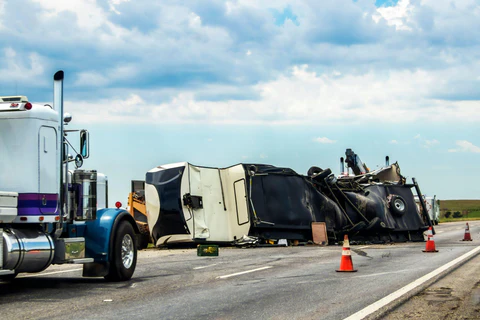Experienced Bronx Truck Accident Attorneys Fighting for Your Rights
Bronx Truck Accident Attorney


When a massive commercial truck collides with a passenger vehicle on Bronx streets, the results can be catastrophic. The Law Offices of Daniel Levy, LLP understands the unique challenges faced by truck accident victims in the Bronx. With years of experience navigating New York’s complex trucking laws and regulations, our dedicated legal team fights tirelessly to secure maximum compensation for injured victims and their families.
Truck accidents differ significantly from typical car accidents due to the sheer size and weight of commercial vehicles. An 18-wheeler can weigh up to 80,000 pounds when fully loaded, compared to the average passenger car’s 3,000 pounds. This massive weight disparity often results in severe injuries, extensive property damage, and complex legal battles involving multiple parties.
Our Bronx truck accident attorneys have successfully represented hundreds of clients, recovering millions in settlements and verdicts. We understand the physical, emotional, and financial toll these accidents take on victims and their families, and we’re committed to holding negligent parties accountable.
Officia officiis vitae hendrerit interdum pretium.
Officia officiis vitae hendrerit interdum pretium.

Truck accident cases require specialized knowledge and expertise that goes beyond typical personal injury law. Here’s why having a dedicated truck accident attorney is crucial:
Commercial trucking is governed by extensive federal and state regulations, including hours of service rules, maintenance requirements, and cargo loading standards. A specialized attorney understands these regulations and can identify violations that contributed to your accident.
Unlike car accidents, truck accidents often involve numerous potentially liable parties, including the truck driver, trucking company, cargo loaders, maintenance providers, and vehicle manufacturers. Determining liability requires thorough investigation and legal expertise.
Trucking companies and their insurers have teams of lawyers working to minimize their liability. You need an equally experienced legal team fighting for your rights.
Truck accidents typically result in more severe injuries and higher damages. Insurance policies for commercial trucks are often worth millions, but securing fair compensation requires aggressive negotiation and litigation skills.
Our comprehensive approach to truck accident cases ensures no stone is left unturned in pursuing your claim:
Immediate Investigation: We dispatch our team to the accident scene promptly to gather crucial evidence before it disappears. This includes photographing the scene, interviewing witnesses, and securing surveillance footage.
Expert Analysis: We work with accident reconstruction specialists, medical experts, and trucking industry professionals to build a compelling case demonstrating liability and damages.
Aggressive Negotiation: Our attorneys negotiate forcefully with insurance companies, refusing to accept lowball offers that don’t fully compensate you for your losses.
Trial Preparation: While many cases settle out of court, we prepare every case as if it’s going to trial, ensuring we’re ready to fight for your rights in the courtroom if necessary.
The moments following a truck accident are crucial for both your health and your legal case. Here’s what you should do:
Semi-trucks and 18-wheelers present unique dangers on Bronx highways. These massive vehicles require longer stopping distances and have significant blind spots. Common causes include driver fatigue, improper lane changes, and jackknifing incidents on highways like I-95 and the Cross Bronx Expressway.
With the rise of e-commerce, delivery trucks flood Bronx neighborhoods daily. These vehicles often make sudden stops, block traffic lanes, and navigate tight residential streets, increasing accident risks. FedEx, UPS, and Amazon delivery vehicles are frequently involved in collisions with pedestrians, cyclists, and other vehicles.
The Bronx’s ongoing development means construction vehicles regularly traverse city streets. Dump trucks, cement mixers, and other heavy equipment pose significant risks, especially when operators lack proper training or vehicles aren’t properly maintained.
Sanitation trucks make frequent stops and often operate during early morning hours when visibility is limited. Their large size and frequent backing up create dangerous situations for pedestrians and other vehicles, particularly in residential areas.
Tanker trucks carrying hazardous materials or liquids present additional dangers. A collision can result in chemical spills, fires, or explosions, creating catastrophic situations that affect multiple victims and require specialized cleanup procedures.


The devastating force of truck accidents often results in severe, life-altering injuries:
Traumatic Brain Injuries (TBI): Even with airbags and seatbelts, the impact force can cause serious brain injuries ranging from concussions to permanent cognitive impairment.
Spinal Cord Injuries: These catastrophic injuries can result in partial or complete paralysis, requiring lifetime medical care and assistance.
Broken Bones and Fractures: The crushing force of truck accidents frequently causes multiple fractures, often requiring surgical intervention and extended rehabilitation. Leg injuries are particularly common and can result in substantial compensation.
Internal Injuries: Damage to internal organs may not be immediately apparent but can be life-threatening without prompt medical attention.
Burns and Disfigurement: Fuel fires and chemical spills can cause severe burns, leading to permanent scarring and disfigurement.
Psychological Trauma: PTSD, anxiety, and depression are common after traumatic truck accidents, requiring professional mental health treatment.
Truck accidents often result in severe physical, emotional, and financial consequences. Our attorneys work to recover full compensation for:
Covers emergency treatment, surgeries, hospital stays, and ongoing rehabilitation.
Reimbursement for time missed at work and reduced earning capacity for permanent injuries.
Compensation for physical pain, emotional trauma, and diminished quality of life.
Covers vehicle repair or replacement and personal belongings damaged in the accident.
In fatal truck accidents, we help families seek compensation for funeral expenses, loss of financial support, and other damages.
Understanding the common causes of truck accidents helps build stronger legal cases:
Driver Fatigue: Federal hours-of-service regulations limit driving time, but violations are common. Tired drivers have slower reaction times and impaired judgment.
Distracted Driving: Cell phone use, GPS devices, and eating while driving contribute to numerous accidents.
Speeding and Reckless Driving: Pressure to meet delivery deadlines often leads to unsafe driving practices.
Improper Loading: Overloaded or improperly secured cargo can shift during transport, causing loss of control.
Poor Vehicle Maintenance: Brake failures, tire blowouts, and other mechanical issues result from inadequate maintenance.
Inadequate Training: Inexperienced drivers may lack the skills necessary to safely operate large commercial vehicles.
Weather Conditions: Rain, snow, and ice create hazardous conditions, especially for large trucks with longer stopping distances.
Blind Spot Accidents: Large trucks have significant blind spots where smaller vehicles can disappear from view.
Determining who is liable in a truck accident requires thorough investigation, as multiple parties may share responsibility:
Trucking companies can be held liable under several legal theories:
Truck drivers may be liable for:
Vehicle and parts manufacturers can be liable when defects contribute to accidents:
Third-party loading companies may be liable for:
Establishing negligence requires proving four key elements:
Our attorneys meticulously gather evidence to establish each element, building a compelling case for compensation.
Comprehensive evidence collection is crucial for successful truck accident claims:
Federal Motor Carrier Safety Administration (FMCSA) regulations play a crucial role in truck accident cases:
Violations of these regulations can establish negligence and strengthen your claim.
Recoverable medical costs include:
Economic damages cover:
Non-economic damages compensate for:
Families may recover:
Case value depends on multiple factors:
Our attorneys provide honest assessments based on experience with similar cases. Learn more about compensation for death in vehicle accidents.
New York follows comparative negligence rules. You can recover damages even if partially at fault, but your compensation is reduced by your percentage of fault. For example, if you’re 20% at fault for a $100,000 claim, you can recover $80,000.
The claims process typically involves:
New York’s statute of limitations for personal injury claims is generally three years from the accident date. However, exceptions exist:
Recent statistics highlight the dangers:
High-risk areas include:
Our firm offers:
Our firm recently represented a Bronx resident injured in a collision with a commercial truck that ran a red light. The client suffered a spinal cord injury requiring multiple surgeries. By demonstrating the trucking company’s negligence in maintaining safe driving schedules, we secured a multi-million-dollar settlement to cover medical expenses, lost income, and long-term care costs.
If you or a loved one has been injured in a truck accident, you need experienced attorneys who can stand up to powerful trucking companies and insurers. The Law Office of Daniel Levy, LLP is here to help you recover the compensation you deserve. Contact us today for a free, no-obligation consultation.
📍 Address: 3144 E Tremont Ave, Bronx, NY 10461
📞 Phone: (929) 600-6422
We work on a contingency fee basis – you pay nothing unless we win your case. Our fees are a percentage of your recovery, typically 33-40%.
Commercial trucks must carry substantial insurance. If coverage is insufficient, we pursue other liable parties and explore additional compensation sources.
Cases typically resolve in 12-24 months, though complex cases may take longer. We work efficiently while ensuring maximum compensation.
Never accept an initial offer without legal consultation. First offers are typically far below fair value.
We handle cases involving out-of-state companies, navigating jurisdictional issues to ensure proper representation.
Don’t face trucking companies and their insurers alone. The Law Offices of Daniel Levy, LLP provides:
Our experienced attorneys review your case at no cost, providing honest assessments of your legal options.
We’re available around the clock for emergency Free Consultations and immediate legal assistance.
You have nothing to lose and everything to gain. Contact us today to protect your rights and secure the compensation you deserve.
Time is critical in truck accident cases. Evidence disappears, witnesses forget details, and insurance companies work to minimize their liability. Don’t delay – contact the Law Offices of Daniel Levy, LLP today for the aggressive representation you need.